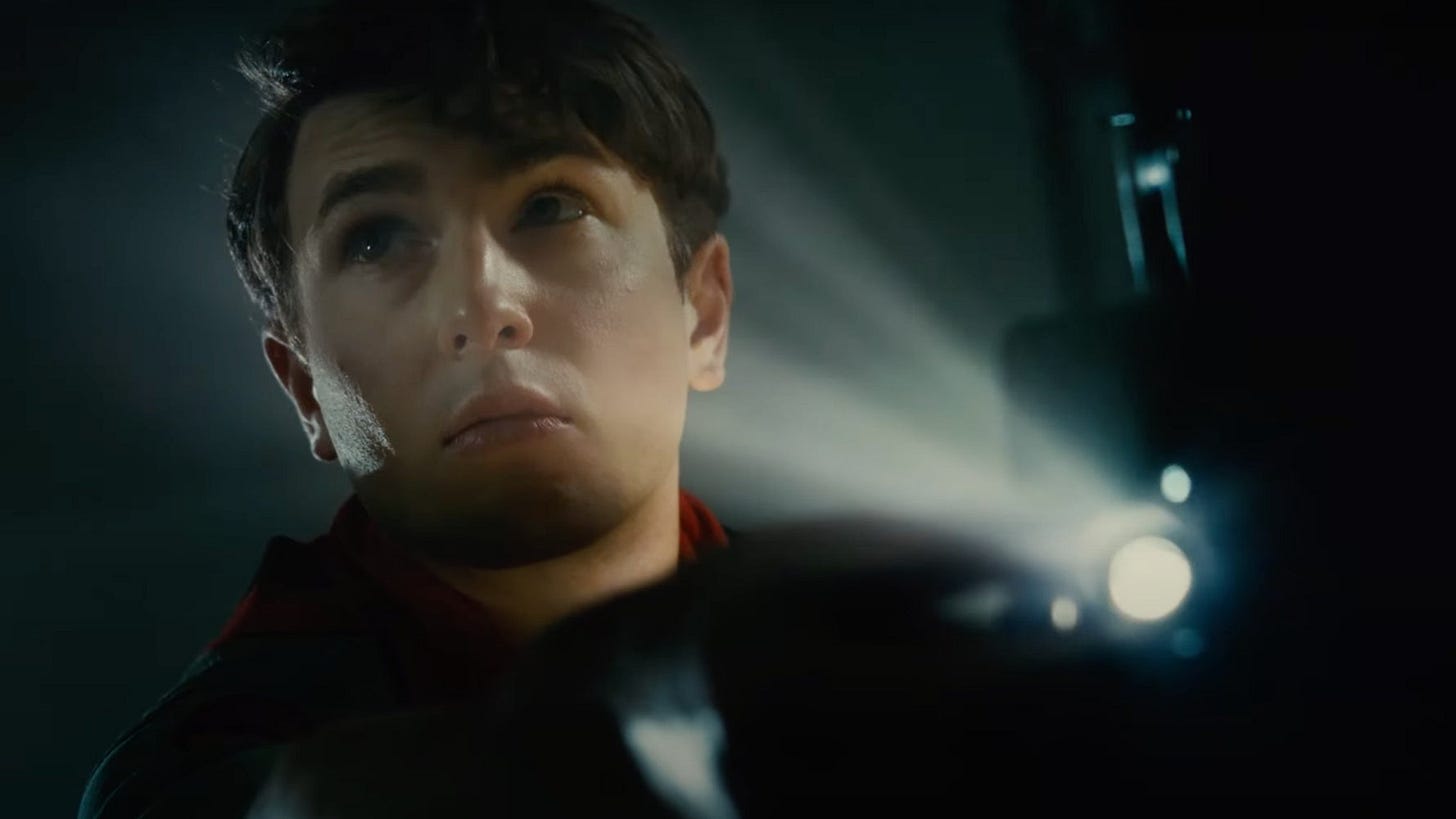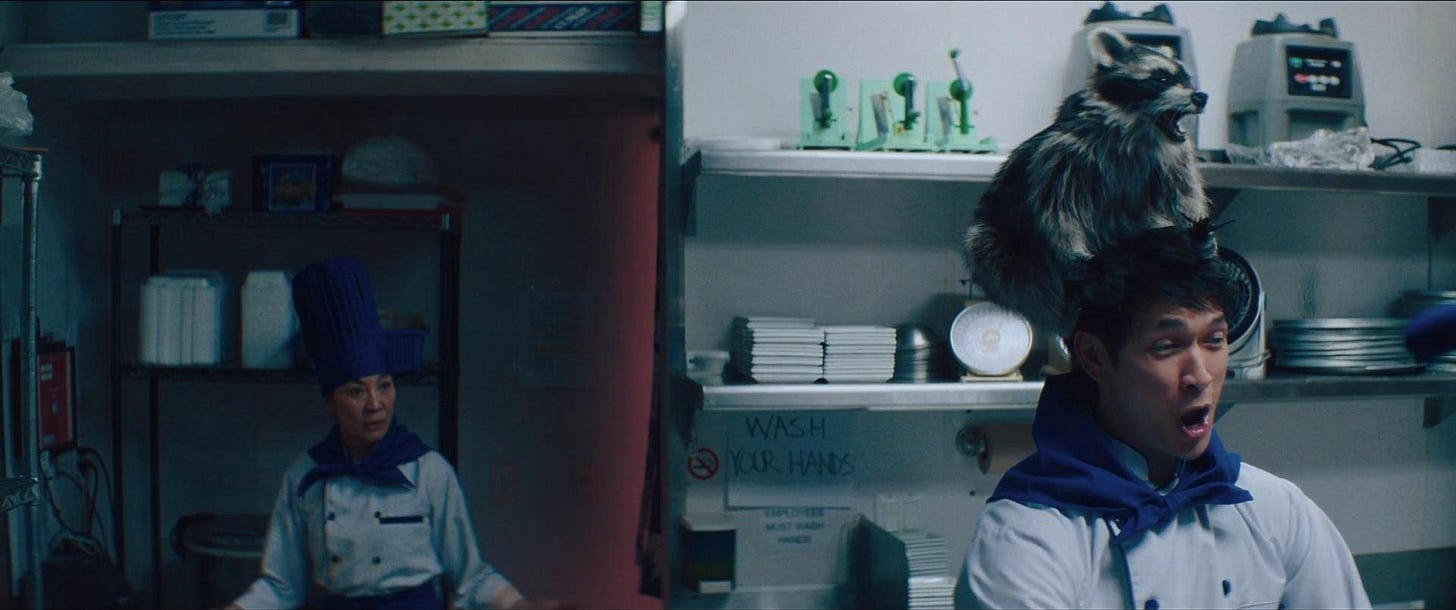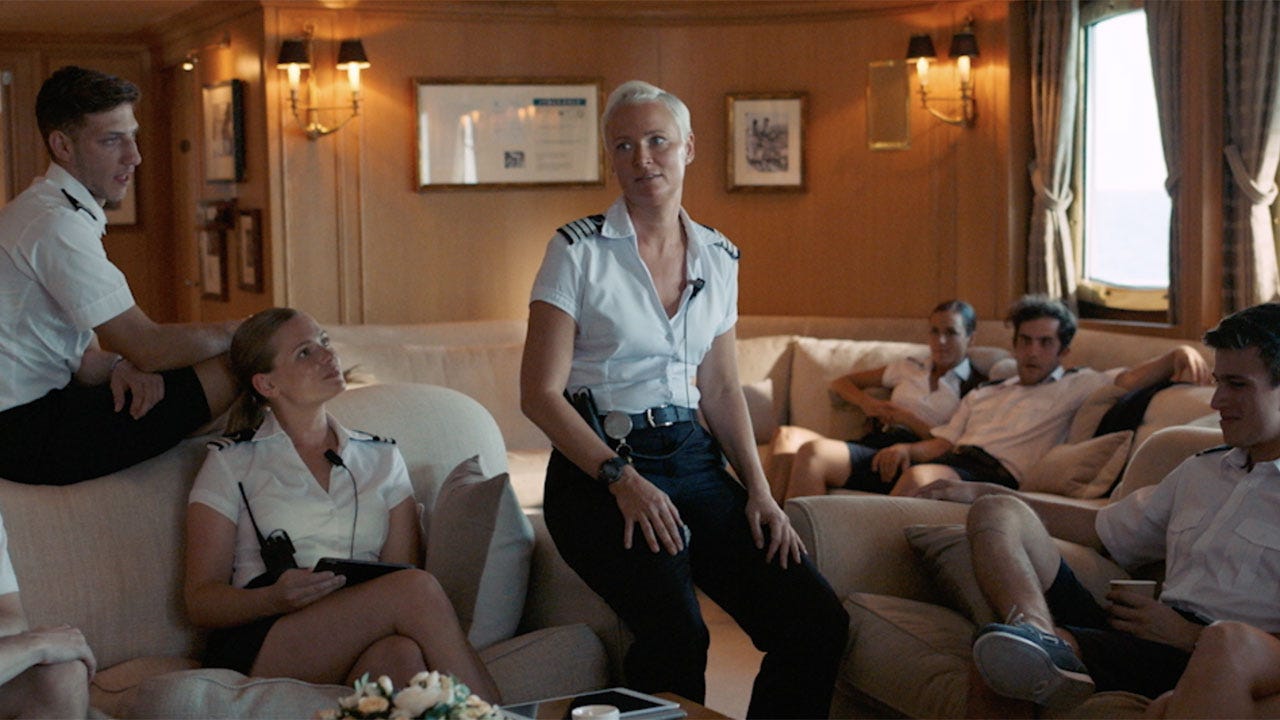#7: Are You Still Watching? Oscars Round-Up 🏆
Featuring film diaries with our impressions, confessions, and digressions
In anticipation of Hollywood’s biggest night, In The Mood Magazine’s editors and contributors share their thoughts on the Best Picture Nominees.
The Fabelmans
by Gabrielle Marceau
I saw the film alone on a morning during TIFF; walking to the theatre, my shoes clicked satisfyingly on the sidewalk and I’d ordered coffee from a cafe bustling with visiting critics and producers. It was one of those moments when you feel that you’re finally embodying the vision you have of yourself. Like the pieces have fallen into place, and you are where you’re meant to be.
After the film, I was also pleased that I had seen it before my boyfriend. I usually see films at the same time as him or not at all. There was always a slight imbalance; I was coming in after his opinion had been formed, an opinion I couldn’t help but form my own against.
To her family, Mitzi Fabelman is a dazzling talent. To the world, she is a housewife. I cried when she was sitting on the side of the road, Burt and the kids perplexed in the station wagon, telling Sammy that she is miserable, but she is “going to stay married to that man.” She’d made this beautiful family, but the sacrifice of self was too great, and she eventually moves out of their big new house in California.
I loved the film, but a line stuck around over the next few days, wedging into my good feeling. “It must’ve been hard for her, married to a genius.” Sammy’s sister, Reggie says after the marriage has fallen apart. “Dad worships Mom.” Sammy replies. “OK, but maybe it’s hard, being worshipped by someone you know you’ll never be as good as, or ever do anything as good as.”
How much does a director reveal of himself when he does not mean to: in an interview with Spielberg in 1999 (22 years after the release of Close Encounters of the Third Kind) James Lipton mentions that Spielberg’s parents were a musician and a computer scientist, and that the aliens in Close Encounters communicated through music made on a computer. Spielberg is delighted to discover this connection, which he had never noticed himself.
“Family. Art. It’ll tear you apart.” Sammy’s uncle passionately intones. This resonates with young Sammy, but I wonder what it means to Spielberg's grown-up self in his big house in California. And I wonder what it means to his wife.
In a 1994 profile with the New Yorker, Kate Capshaw recounts a moment when she and Spielberg were watching TV and they landed on a channel playing Indiana Jones and the Temple of Doom—his major hit and her breakthrough role. “What happened to my career after that movie?” she asks him. “You weren’t supposed to have a career. You were supposed to be with me.”
But Kate actually agreed. She claims to not have the unrelenting drive it takes to be a movie star, and found meaning and excitement in her home life. “... I get to be the frontierswoman here, and he gets to be the frontiersman there.” That this sounds depressing only says something about me, someone who feels most like herself walking alone on a busy street in an impractical pair of shoes, going to see a movie that she’ll write about one day.
Gabrielle Marceau is a writer and a critic.
Everything Everywhere All At Once
by Sennah Yee
A few weeks ago, my friends referenced Raccacoonie from EEAAO, and I thought they were speaking another language—“wait, what?” I said, completely genuinely. Turns out that without meaning to, I had completely forgotten about the sub-universe.
I don’t despise the movie—when the trailer first dropped I sent it to my family’s group chat, marveling at how Michelle Yeoh had a leading role in an A24 movie. “We have to see this,” my mom excitedly replied. We saw it as soon as it came out. Watching a movie about intergenerational love and trauma, starring Asians, right next to my Asian mom? Of course I cried. And my mom did, too—a rarity for her.
But as time goes on, I know that I don’t love the movie, either. Which makes me feel a little guilty, like a Bad Asian. With such slim pickings of all-Asian casting in Hollywood, I feel a pressure to support anything that comes my way. I better love it; it might be all I’ll get. I know it’s unreasonable, but I can’t help it.
While the movie itself faded away for me, feelings about it only grew stronger on my feeds—and eventually, in me too. Every tweet I see about it seems to exist in polar opposite of the other: the movie is extraordinary vs. the movie is overrated af; Michelle Yeoh is a GODDESS who deserves this success vs. guys, Michelle Yeoh’s ALWAYS been successful, just not according to your Western-centric standards; “I want to run a laundry and do taxes with you” is the best line in cinematic history!!! 😭😭😭 vs. if I read that corny ass EEAAO quote ever again I’m gonna fucking die.
I guess this is just how the insufferable internet works. And where do I fall? I guess in insufferable Libra fashion… somewhere in the middle. But when I see a white person calling it overrated, I can’t help feeling this weird, twisted pang. Because yes, I agree to an extent—but also I’m like, how could you understand what this could mean? Can’t you see there’s something here?
Like many people, caring about representation in the media was my natural, accessible gateway to identity politics and social justice. I remember scrolling on tumblr and seeing one of those “Every Single Word Spoken By a Person of Color” movie supercuts, some only seconds long, and feeling like something was coming together for me. It felt like I could finally prove my alienation, absence. Look! There’s nothing there!
Since then, like most things on the internet, the word has become abuzz. Since then, for me, representation has been important, life-changing, loaded, simple, reductive, overused, marketable, cringey, confusing… just like this movie, it can mean everything to some—and nothing to others—yes, all at once. I found the story both half-baked and overcooked, and I didn’t really relate to anyone, in any universe. My family has always been very accepting and loving, and our traumas seep out in different ways. But I found myself soothed by the smaller moments in the movie: eye and nose shapes that remind me of my parents, myself; comforting Chinese accents and tones. And in one of the last scenes, I noticed that Michelle Yeoh and I were wearing the same jade donut pendant. I had just bought mine days before, a feeble gesture to reconnect with my roots, and had intentionally worn it for the first time to the movie.
Even if the movie itself hasn’t stayed with me, these details and the memory of watching it next to my mom will. And sure, maybe awards don’t mean anything, but what does it mean when Ke Huy Quan and Michelle Yeoh’s Golden Globe acceptance speeches make me cry at my desk? To live decades without seeing someone somewhat like you on the big screen, treated with love, respect, nuance… it’s only natural to believe that there is no place for you. So while I’m starving, I’ll keep taking what I can get—even if it means feasting on crumbs, like a Raccacoonie.
Sennah Yee is the author of How Do I Look? and My Day With Gong Gong.
Triangle of Sadness
by Anna Grace
I clip my name-tag onto my only summer blazer, its inner lining stained under the arms with evidence of past exertions. The day is young, and it’s dried out since last shift. Upstairs, I turn the lights on across the hotel; the front desk, the foyer, the table lamps in our reading lounge, paired with armchairs of green leather and brocade. The carved wood of the walls and ceiling, the diamond-patterned carpet, rest in quiet.
Time passes, and I’m sweating, run-walking stiffly down the hallway with pink cheeks, wide eyes, sleeves rolled up, a grimace—I am not beautiful. Pause and smile if a guest opens the door from within their room, or I barely evade collision in a stairwell. The restaurant staff haven’t shown up. The housekeepers are useless, betray me. Maybe worst of all, the new girls I’ve left down at the desk, minding the phones, are just hanging out. They don’t play along.
At the end of it all, I take the blazer off. My girlfriend meets me on the sidewalk. It’s sunny out, and 3:00 pm, and Triangle of Sadness is playing at the Odeon in 30 minutes. It won the Palme d’Or. It’s perfect timing.
I must be tired. Come the second act, when the story shifts to life on a luxury yacht, I begin seeing familiar faces on screen. The things the characters say, these aren’t new words to me, they are my own conversations. And that blonde head of staff, with the sensibly short haircut, flushed, frigid, suffering so immensely at the hands of her underlings, superiors, guests... Could it be?
A waitress’ eyes water as she’s pushed to the brink of saying “no” to a guest that is determined to make her enjoy herself. The most obstinate of all crew members must agree, through gritted teeth, to do something about the sails of the boat that the boat does not have, because a husband and wife are convinced that they exist and that they need cleaning. On a tropical island, a young male model fingers an older woman, and tells her he loves her, because she keeps him fed. This is the business. Conversation, kindness, intimacy for sale. Man, woman, guest, staff.
We stumble from the theater, seasick, and stop in the light of the somehow still-sunny afternoon. My girlfriend looks at me, and I know she sees it too—my face and the blonde’s, merged into one.
Anna Grace is a receptionist.
Tár
by Celia Mattison
I see Tár at possibly the worst theater in Manhattan, the train rumbling underneath every few minutes, and the dialogue from the opposite theater bleeding into ours. The audience remains rapt, each external noise an early reminder of the fragility of Lydia Tár’s obsessive, orderly world. As soon as we see her hold that red Birkin bag, identical to the one held by an effusive fan just a few moments prior, we see how plain her desire is.
In Tár, I see so many women I have admired; exacting, work-minded, disinterested in trends. And in her I see the men I have studiously avoided: enraptured by female youth, wrecked by the pursuit of legacy, obsessed with showcasing their power even when it eclipses their talent. Tár is always enclosing herself, in endless layers of sweaters and tailored shirts, in brutalist concert halls, in the old apartment turned office and den of seduction. She sanitizes her hands, shuts doors, deletes emails that might invoke consequences. The construct is so obvious it seems impossible that Tár can believe in it, and yet when she returns to her childhood home we see how firmly she does. She has built Tár out of what seems like nothing, and if there’s one thing that separates her most from the Gen Z students she mocks, it’s that she has no interest in mythologizing her background.
Every time the train groans below I flinch, mimicking Tár’s sudden rigidity when she hears an unfamiliar cell phone ring. Everything is always interrupting her work, everyone intrudes on the purity of sound she is seeking. It is devastating to discover that the last and worst intruder is her own ego. I leave the theater with the question of redemption. Will the skill of her work redeem her, the way it has redeemed so many other bad men? And what does it mean if I want it to?
Celia Mattison is the author of Deeper Into Movies.
All Quiet On The Western Front
by Adrian Murray
In the days before streaming I rented the VHS of the 1930s version of All Quiet On The Western Front from the library. I was hoping for an exciting war epic, something like Saving Private Ryan. Preteen me was pretty disappointed by the 1930s pacing and soliloquizing. I think I shut it off and played video games instead. But now here I am, watching 2022’s All Quiet because I remembered turning it off as a kid. And this looked like what I wanted then: a movie that wasn’t ashamed to be loud, slick, and full of violence.
And this film is loud, slick, and full of violence! A sparse dubstep horn theme keeps time as we watch men shoot each other, stab each other, get crushed by tanks, and get burned up by flamethrowers. We open with one soldier dying, then follow the process of his uniform being gathered, mended, and given to our new lead. It’s not a disagreeable message, this notion that these young boys are just cannon fodder for the war machine, but I was left feeling like this related more to how Netflix made this film: efficiently, and from recycled parts to feed the content machine.
So here I am, 20 years later and disappointed again. Maybe this isn’t a bad movie, but I question whether, during an escalating war in Europe, another war movie is really a good idea. I question the discourse around the film, the idea that it really is anti-war. After all, I’ve been to film school and heard Truffaut’s quote about how there’s no such thing as an anti-war film! Now I overthink the notion that you can show how bad something is by recreating it and selling it. I’ve come to see Saving Private Ryan as not anti-war, but pro-victory. Now I have complicated thoughts about how, ethically, maybe I shouldn’t be interested in playing Call of Duty: WWII Nazi Zombies.
With its interchangeable re-spawning characters and crisp action scenes, I felt like I was watching a game walkthrough instead of a movie. I thought about how Steven Spielberg produced the PS1 game Medal Of Honor after being inspired by watching his son play GoldenEye 007. I remembered how the opening sequence of the video game mirrors the opening battle in Saving Private Ryan.
I remembered the expansion packs in Medal of Honor for each different location of WWII. I remembered that different war locations are in fact called theatres. I thought about uniforms and parades, and how bombs don’t need to scream as they fall, but they are designed to do so anyway. I wondered if the real tragedy of war is that it might lack an audience.
Berger’s All Quiet certainly makes the effort to underline the idea that war is a tragedy, noting in text that 9.7 million died in WWI and the frontline barely moved. But it was hard for me to see this as an anti-war point. It’s also a description of all the games I play with millions of deaths on familiar and unchanging maps. It’s the whole point.
Adrian Murray is a filmmaker from Toronto.
The Banshees of Inisherin
by Blair Elliott
Colm and Pádraic live on an island. Every day they go to the pub together. Until one day, they don’t. Colm doesn’t want to be friends with Pádraic anymore. The time they waste, he decides, could be better spent composing music, something that will create a legacy. The abrupt change in routine destabilizes Pádraic to his core. He can’t accept that Colm would rather (literally) cut off his own fingers than speak to him again. He also can’t accept the idea of Colm wanting something more.
But his sister, Siobhán, can. She watches, caught between both sides. She loves her brother, dull as he may be, and sees how hurt he is by Colm’s rejection. She sees through Colm’s pretenses and cuts him down to size—is there a single better retort this year than “ye’re all feckin’ boring!”? At the same time, Siobhán, like Colm, aspires to something more than dreary island life. Early in the film, Pádraic tells his sister she shouldn’t be reading a sad book, “else you might get sad.” A small, wistful smile appears on her face. “Do you never get lonely, Pádraic?” she asks carefully, seeking some sort of bond, some way to communicate that she is sad, that she is lonely. “Never get wha?” her brother responds, incredulously. She’s left alone, looking at her reflection in a broken mirror.
It’s easy to say I see myself in Siobhán, literate and ambitious and fed up with masculine bullshit. It’s harder to describe how through her I feel some essential truth about my lineage, a long history of women quietly resigned to their fate. The ones who cry in the middle of the night, and respond “nothing” when asked what’s wrong. My great-grandmother would have been about her age, living in another remote part of Ireland. Did she resent her surroundings, or clash with her neighbours? Was she also misunderstood by those closest to her? Did she want more? (Doesn’t everyone?)
The conflict between the two men escalates (a microcosm of the civil war on the mainland). Colm believes it’s important, necessary, to devote one’s life to art, but his fervor leads to self-mutilation (not ideal for a fiddler). Pádraic insists that what matters most is whether someone was a nice person, but his frustration sends him down a path of cruelty and crime. Only Siobhán is able to escape the despair of Inisherin. “It’s lovely here,” she writes to her brother from her new home. “The people already seem less bitter and mental.” The film doesn’t show her, but I can picture her perfectly, looking out her window, having finally found peace.
Blair Elliott is an event producer and writer based in Montreal.
Top Gun: Maverick
by Ethan Vestby
I don’t know if I can bring myself to watch Top Gun: Maverick again, if only because that Saturday afternoon in May was too perfect. Why? Well because I remember turning to my viewing partner with a slight twinge of embarrassment in my voice, remarking “I was actually crying there at the end,” to which I noticed tears streaming down his own face as he said “same.” I’m not sure if that sensation could be replicated with another IMAX viewing or even popping in the 4K Blu-ray on a simmering OLED television. Just on that day, at that moment in time, the naked sentimentality of Tom Cruise and Miles Teller reuniting on an aircraft carrier spoke to me emotionally in a way few recent films had. It felt less like a new action classic and more like the definitive male weepie of the 21st century. Some films should be preserved as perfect memories, and I’m not willing to risk finding it corny in the future.
I’ll say one last thing, that I spoke to a friend who saw a test screening waaaaaay back in 2019 and said that the entire introduction and post-film Q&A was done by Christopher McQuarrie. He’s probably the actual director, not the middling Tron: Legacy/Oblivion helmer Joseph Kosinski. You heard it here first, okay?
Ethan Vestby is critic, teacher, and programmer.
Elvis
by Sennah Yee
My timeline of going from clueless to crazy about Elvis, thanks to Elvis (2022):
September 2015: My boyfriend and I are doing basement karaoke with some friends at Form Lounge (RIP). When the opening bars of “Suspicious Minds” come on, no one, myself included, knows the song. Still, I love how he sings it passionately, on his own.
June 2019: My fiancé and I decide to choose Elvis’ “I Can’t Help Falling In Love With You” as our first dance wedding song. It means nothing to our relationship, but we like how short it was, so we don’t have to be up there dancing too long.
February 2022: When the Elvis trailer drops, I roll my eyes and tell my husband, “you’re gonna see this one on your own.”
May 2022: My husband and I book an Elvis-themed basement karaoke room with some friends at Bar Mordecai. I film him singing “You’re Always On My Mind” and post it to my Instagram story. My husband takes a photo of me posing with a painting of Elvis hanging against a leopard-print wall and I post it to my Instagram feed, captioning it “Elvis (2022)” despite not having seen, or wanting to see, the movie.
July 2022: After recovering from COVID, my husband and I are craving something big and bold for our first movie back in theaters. So, we finally see Elvis (2022). And then we see it again. And one more time, with my parents, at my request. When I go over to their place, I see my mom wrote on the calendar on today’s date: “Sennah - lunch, Elvis.” My mom shows me an Elvis mug that she’s always kept in the kitchen cabinet. My late grandmother had gone to his home in Graceland once, and bought one for each of her five kids as a souvenir. I look up flights to Memphis. My friend comments on my Instagram post of me in the Elvis-themed karaoke room, saying “this hits different now LOL.”
August 2022: My husband and I go to a cottage with friends, where we all watch the Elvis ‘68 Comeback Special on a laptop. On our way home we stop by at a vintage store, where there’s an entire section of Elvis paraphernalia. We buy a little framed photo of Elvis singing in a white jumpsuit and hang it above our TV.
September 2022: Ahead of my 30th birthday, I buy my first pair of fake leather pants. I wear them to my karaoke party and sing “Suspicious Minds.”
December 2022: Spotify Wrapped informs me I’m in Elvis Presley’s top 0.05% listeners. I receive three Elvis-themed Christmas gifts from my mom: a book, a calendar, and socks.
Date TBD: My husband and I make a plan to renew our wedding vows in Las Vegas at the Graceland Wedding Chapel. I review all the different package descriptions on the Geocities-looking website, each assuring me that “Elvis will escort the Bride down the aisle and give her away.”
Sennah Yee is the author of How Do I Look? and My Day With Gong Gong.
Avatar: The Way of Water
by Jordyn Streisfield
I still remember when I saw the first Avatar, back in 2010. My parents bought it on DVD from a sketchy guy who worked at our local convenience store, and I watched it on my little portable DVD player I brought on road trips. I remember a scene where a pilot gets shot, and you see her blood on her hands, as she struggles to keep the helicopter aloft. It was the first time I’d ever seen blood in a movie, and I was terrified.
Years later, I find myself in comfy recliner chairs, sitting between my parents as the lights dimmed in the theater. The memories of the first film had settled comfortably in the back of my mind, dismissed as another irrational childhood fear. What worried me, though, was that I barely remembered anything about the previous film. I’d heard its praises sung by other film students, for its beautiful landscapes and creature design, but I couldn’t recall anything beyond a parody skit I’d seen on an episode of Robot Chicken.
My expectations were immediately blown away when I saw the alien rainforest at night for the first time. The darkness of the theater made the sights of Pandora all the more vibrant, all the more mesmerizing. The lush jungles and glittering seas stirred up feelings of pure joy in me, nearly bringing a tear to my eye because of their sheer beauty. Every scene made me want to go there, to see the planet for myself.
Of course, I could go to Disney’s Animal Kingdom and see their Avatar land for that, but until they make the dragons from the movie real so I can pet them, I think I’ll stick with the movies for now.
Jordyn Streisfield is a film student with a passion for movies and pop culture.
Women Talking
by Jessica Beebe
In the movie Women Talking, which takes place in 2010 on an isolated Mennonite colony, the Women Who Talk™ discover that the men have been using cow tranquilizer to subdue and assault them. It can be extremely unnerving to take in. When the men temporarily leave the colony to oversee the bail of two who were arrested, the women are able to convene for some heavy discussions; they spend the movie trying to figure out whether they should stay or flee, assessing their faith and dignity in the meantime. It makes for a compelling watch—it is difficult to predict what they will decide, each option terrifying in its own way. Every argument the women examine has leverage, though you root for them to abandon ship.
The movie is based on a 2018 novel by Miriam Toews, but it feels like a play. You can picture, especially if you read the meticulously crafted screenplay, how writer/director Sarah Polley carefully blocked each scene. The way the women move about the room is occasionally breathtaking. Claire Foy gives an intense performance as Salome, and Jessie Buckley takes a terrific turn as Mariche. Perpetual Oscar winner Frances McDormand, who also produces the film, appears so briefly (as “Scarface Janz”) it’s almost humorous. And Rooney Mara, as the complicated Ona, reminds us of her performing prowess. If you like these actors, you should watch the movie—someone just has to tell me why their intense, calculated work hasn’t received more attention this awards season.
The outstanding, and seemingly timeless, message of the film, which focuses on women rescuing themselves, is told in an achingly effective (and sometimes disturbing) way. The tone of the movie is engaging and even thrilling—like when we learn that Mariche’s abusive husband is returning to the village early, or when Salome sedates her son with the same tranquilizer the men used on her—rather than predictable or pedantic. Polley succeeds in making a timeless point about how women can lean on each other and save themselves without the audience feeling as if she is preaching to them. And Women Talking, despite its bleak and heartbreaking subject matter, has an uplifting ending. It’s even funny—aside from the parts when the lighting is so dark, you’re left wondering if something is wrong with your TV.
Jessica Beebe is a writer and editor based in NYC.
Call For Submissions: Issue 7
We’re accepting submissions for Issue 7: Comics & Cartoons until March 31st. Pitch us your ideas on animated films, comic book adaptations, kids cartoons, and more:
Wondering what to watch?
Choose a mood on our Film Recommendation Generator and get a curated pick from writers, filmmakers, poets, and artists.
Donate
If you’d like to donate to our mag you can do so through our PayPal! We're volunteer-run, and donations go directly to the mag and contributor honorariums.
















loved this!